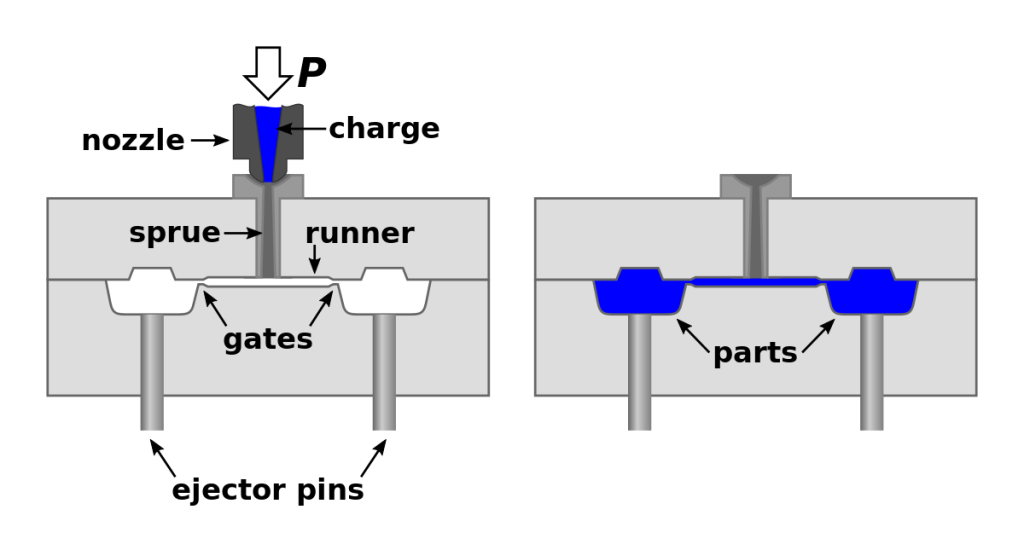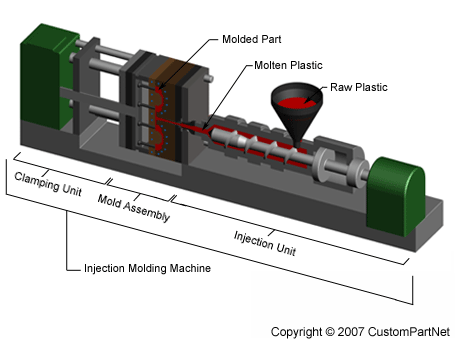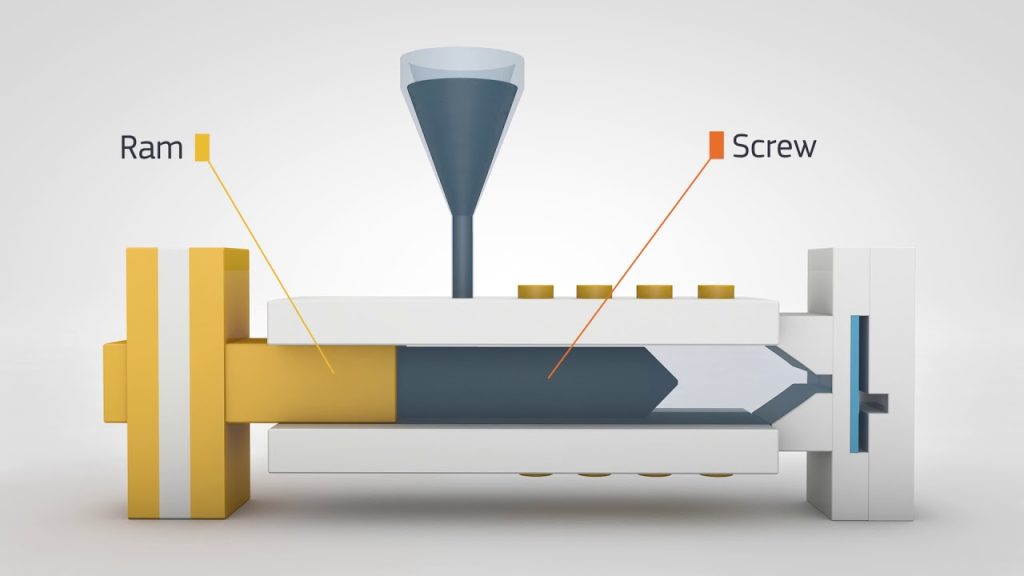Table of Contents
Do you want to know if thermoset plastics can be injection molded? Well, the simple answer is yes! But, it’s not as straightforward as it may seem. In this article, we will explore the complexities of injection molding thermoset plastics and what makes it different from molding thermoplastics.
Thermoset plastics have unique properties that make them desirable for certain applications. However, their inherent characteristics also make them more challenging to mold than thermoplastics. We will delve into the types of thermoset plastics that can be injection molded, the process of injection molding them, and the benefits and limitations of using this method for thermoset plastics. So, keep reading to learn more about this fascinating topic!
Thermoset Plastics and Injection Molding
Thermoset plastics are a type of polymer that, once cured, cannot be melted or reshaped. This makes them ideal for applications where high temperature or chemical resistance is required. However, this property also makes it difficult to process these materials using traditional methods, such as injection molding. In this article, we will explore whether thermoset plastics can be injection molded, and if so, what are the benefits and drawbacks of this process.
What are Thermoset Plastics?
Thermoset plastics are a class of polymers that are cured, or cross-linked, during the manufacturing process. This means that once they are molded into a specific shape, they cannot be melted or reshaped. This is in contrast to thermoplastic materials, which can be melted and reshaped multiple times.
Thermoset plastics are widely used in applications where high temperature or chemical resistance is required. They are commonly used as insulation materials, adhesives, and in electrical components. Some common examples of thermoset plastics include epoxy, phenolic, and silicone.
Can Thermoset Plastics be Injection Molded?
Injection molding is a popular manufacturing process for thermoplastic materials, but can thermoset plastics be injection molded? The short answer is yes, but the process is different from traditional injection molding.
Thermoset plastics require a different type of injection molding machine, known as a transfer molding machine. In this process, the uncured thermoset material is placed into a chamber, which is then heated and pressurized to force the material into a mold cavity. The mold is then cooled, and the cured part is removed.
The transfer molding process is more time-consuming and expensive than traditional injection molding. However, it allows for the production of complex shapes and can be used with a wider range of materials.
Benefits of Injection Molding Thermoset Plastics
There are several benefits to using injection molding for thermoset plastics. First, it allows for the production of complex shapes with tight tolerances. This is especially important for applications where precise dimensions are required.
Second, injection molding can be used to produce large quantities of parts quickly and efficiently. This makes it ideal for high-volume manufacturing applications.
Finally, injection molding can be used with a wide range of thermoset materials, including epoxy, phenolic, and silicone. This allows for greater flexibility in material selection, depending on the specific requirements of the application.
Drawbacks of Injection Molding Thermoset Plastics
While there are benefits to using injection molding for thermoset plastics, there are also some drawbacks to consider. First, the process is more time-consuming and expensive than traditional injection molding.
Second, the transfer molding process requires a different type of injection molding machine, which may not be readily available or may require additional training to operate.
Finally, because thermoset plastics cannot be melted or reshaped, any scrap or defective parts cannot be recycled or reused. This can lead to increased waste and disposal costs.
Thermoset Plastics vs. Thermoplastics
Thermoset plastics and thermoplastics are two different types of polymers with distinct properties. Thermoset plastics, as we have discussed, cannot be melted or reshaped once they are cured. Thermoplastics, on the other hand, can be melted and reshaped multiple times without losing their properties.
Thermoplastics are generally easier to process than thermoset plastics, and can be used in a wider range of applications. However, thermoset plastics offer superior temperature and chemical resistance, making them ideal for high-performance applications.
Applications of Injection Molded Thermoset Plastics
Injection molded thermoset plastics can be used in a variety of applications, including:
- Electrical components
- Aerospace and defense
- Automotive parts
- Medical devices
- Consumer goods
Because thermoset plastics offer superior temperature and chemical resistance, they are commonly used in applications where these properties are critical.
Conclusion
In conclusion, thermoset plastics can be injection molded using a transfer molding process. While this process is more time-consuming and expensive than traditional injection molding, it allows for the production of complex shapes with tight tolerances. Injection molded thermoset plastics offer superior temperature and chemical resistance, making them ideal for high-performance applications in a variety of industries.
Frequently Asked Questions
Thermoset plastics are a popular material for a wide range of industrial applications due to their excellent stability and resistance to high temperatures. However, many people wonder if these materials can be injection molded effectively. Here are five common questions and answers about the injection molding of thermoset plastics.
Can thermoset plastics be injection molded?
Yes, thermoset plastics can be injection molded. However, the process is different from that used for thermoplastics. Thermoset plastics are typically molded using a compression or transfer molding process, rather than injection molding. This is because the materials cannot be melted and re-melted like thermoplastics, so they must be formed using a one-time curing process.
The injection molding of thermoset plastics is a more complex process than that used for thermoplastics, as it requires specialized equipment and tooling. However, advances in technology have made it possible to injection mold certain types of thermoset plastics, such as BMC and SMC materials.
What are the benefits of injection molding thermoset plastics?
Injection molding of thermoset plastics offers several benefits over other molding processes. First, it allows for the production of complex shapes and parts with tight tolerances. Second, it can be used to produce large quantities of parts quickly and efficiently. Third, it can be used to produce parts with excellent dimensional stability and resistance to high temperatures.
Additionally, injection molding of thermoset plastics can be used to produce parts with excellent mechanical properties, such as high strength, stiffness, and impact resistance. This makes them ideal for use in a wide range of industrial and commercial applications.
What types of thermoset plastics can be injection molded?
Several types of thermoset plastics can be injection molded, including BMC, SMC, and phenolic materials. These materials are commonly used in applications where high strength, dimensional stability, and resistance to heat and chemicals are required.
BMC and SMC materials are particularly well-suited for injection molding, as they can be made into complex shapes and parts with excellent dimensional stability and mechanical properties. Phenolic materials are also commonly used for injection molding, as they offer excellent resistance to high temperatures and chemicals.
What are the challenges of injection molding thermoset plastics?
The injection molding of thermoset plastics presents several challenges that must be overcome to ensure optimal results. One of the biggest challenges is the need for specialized equipment and tooling, which can be expensive to acquire and maintain.
In addition, the curing process used in injection molding of thermoset plastics can be difficult to control, which can lead to inconsistencies in part quality. Finally, the materials themselves can be challenging to work with, as they require precise curing times and temperatures to achieve the desired properties.
What industries commonly use injection molded thermoset plastics?
Injection molded thermoset plastics are used in a wide range of industries, including automotive, aerospace, electrical, and medical. These materials are commonly used for parts and components that require high strength, dimensional stability, and resistance to heat and chemicals.
Some specific applications for injection molded thermoset plastics include electrical connectors, automotive engine components, and medical device housings. With their excellent mechanical properties and resistance to high temperatures and chemicals, thermoset plastics are a versatile material that can be used in a wide range of industrial and commercial applications.
In conclusion, the answer is yes, thermoset plastics can be injection molded. While it may come with some challenges, advancements in technology have made it possible to mold thermoset plastics to meet specific design requirements.
Injection molding offers many benefits, including high production rates, repeatability, and cost-effectiveness. By using specialized equipment and techniques, it is possible to produce complex shapes and sizes with tight tolerances.
Overall, the ability to injection mold thermoset plastics opens up new opportunities for manufacturers looking to produce high-quality, durable products. With the right expertise and equipment, it is possible to overcome the challenges and take advantage of the benefits of this process.
Request a quote today!
[contact-form-7 id="1578" title="Contact form"]
Please compress the file into a ZIP or RAR file before uploading. Alternatively, send through your RFQ by email.
enquires@unitymanufacture.com





